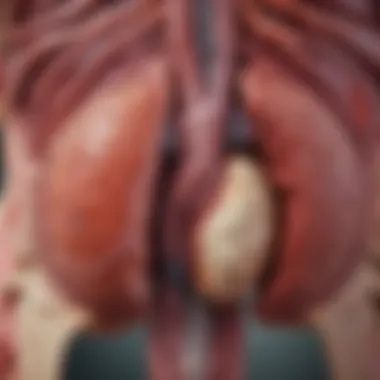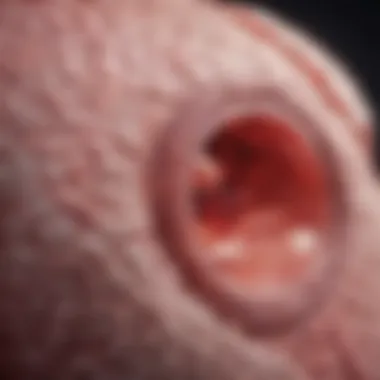Collagen Supplements and Liver Cirrhosis: A Scientific Exploration


Intro
The relationship between collagen supplements and liver cirrhosis has become a significant area of investigation in recent years. Liver cirrhosis is the result of chronic damage to the liver, leading to scarring that affects the organ's ability to function properly. Understanding how collagen, a protein abundant in the human body that plays a critical role in tissue structure, correlates with liver health is imperative for both patients and medical professionals. This article aims to explore scientific insights into this connection, with a focus on the implications for managing liver conditions through potential supplementation of collagen.
Background and Context
Overview of the research topic
Liver cirrhosis arises from various causes, which include chronic alcohol consumption, viral hepatitis, and non-alcoholic fatty liver disease. The progression of cirrhosis is often linked to persistent liver injury, leading to the overproduction of collagen during the repair process, thereby causing fibrosis. A skincare focus has brought collagen supplements to the forefront of nutritional discussions, raising questions about their effects on liver health.
Historical significance
Historically, collagen has been primarily recognized for its role in skin health and joint care. However, recent research has indicated that collagen may also have a beneficial impact on liver tissue. The shift in perspective suggests a deeper understanding of how this protein functions at the cellular level, particularly in the context of repairing damaged tissues. Studies from the past decade have started to provide insights into the biochemical pathways influenced by collagen supplementation, and more research is required to validate these findings in cirrhotic patients.
Key Findings and Discussion
Major results of the study
Initial data indicates that collagen supplementation might aid in minimizing liver fibrosis, thereby potentially slowing the progression of cirrhosis. Certain experimental models have shown that collagen peptides can influence the behavior of liver cells, possibly enhancing cellular repair functions. While human clinical studies are limited, the preliminary results highlight a promising avenue for further inquiry.
Detailed analysis of findings
Recent clinical trials have focused on how collagen interacts with liver cells. It appears that collagen may modulate inflammation and promote regeneration in the liver. However, understanding the correct dosage and long-term effects of these supplements remains crucial. Additionally, individuals considering collagen for liver health should consult healthcare professionals to determine its appropriateness based on their unique health conditions.
Research indicates that while collagen supplements hold potential, further studies are necessary to establish definitive benefits for liver cirrhosis.
Understanding Liver Cirrhosis
Understanding liver cirrhosis is essential in the context of exploring collagen supplements. Liver cirrhosis represents a significant health concern, characterized by the irreversible scarring of the liver. This condition affects liver function, leading to various complications that impact overall health. When investigating potential treatments or supplementary options, it is crucial to grasp the underlying mechanisms, causes, and symptoms of liver cirrhosis. An awareness of these factors can help inform discussions around supplementation and its possible role in managing liver health.
Definition and Overview
Liver cirrhosis is defined as the advanced scarring of the liver tissue. This disease results from numerous factors, including chronic liver inflammation and damage. As the liver attempts to heal itself, fibrous tissue replaces the damaged cells, leading to a progressive decline in liver function. This condition is often diagnosed late due to its insidious nature, making early intervention crucial for better outcomes.
Causes of Liver Cirrhosis
Cirrhosis originates from several factors. Recognizing these causes can assist in effective management practices and identifying individuals at risk.
- Alcohol-related liver disease: Chronic and excessive alcohol consumption is a leading contributor to liver cirrhosis. Long-term alcohol abuse causes inflammation and progressive damage to liver cells, resulting in fatty liver disease, alcoholic hepatitis, and ultimately cirrhosis. The unique feature of alcohol-related liver disease is that it is entirely preventable through lifestyle changes.
- Hepatitis infections: Viral hepatitis B and C infections are significant contributors to liver cirrhosis. They cause chronic liver inflammation that can lead to cirrhosis over time. Early detection and treatment of hepatitis can halt the progression to cirrhosis. Hepatitis infections present both an advantage and disadvantage in the context of cirrhosis management due to the possibility of medical intervention.
- Non-alcoholic fatty liver disease: This condition occurs when fat accumulates in the liver, independent of alcohol use. This can result from obesity, diabetes, or high cholesterol. The growing prevalence of non-alcoholic fatty liver disease makes it a relevant topic within liver health discussions. It can be effectively managed through lifestyle modification and monitoring.
- Genetic disorders: Certain genetic conditions, such as hemochromatosis and Wilson's disease, can predispose individuals to liver cirrhosis. These disorders disrupt normal liver function and can lead to significant organ damage if not treated. Understanding these genetic links can provide important insights for risk assessment and disease management.
Symptoms and Diagnosis
Recognition of symptoms plays a key role in the diagnosis of liver cirrhosis. This section explores specific symptoms that arise in affected individuals.
- Early symptoms: In the early stages, liver cirrhosis may produce mild and vague symptoms, such as fatigue, weakness, and diminished appetite. These nonspecific indicators often lead to delayed diagnosis, which emphasizes the importance of awareness among healthcare providers and patients.
- Advanced symptoms: As the disease progresses, more severe symptoms may occur. These include jaundice, swelling in the legs or abdomen, and confusion. Understanding the progression is critical for timely intervention.
- Diagnostic procedures: Several diagnostic methods are employed to confirm liver cirrhosis. These include liver function tests, imaging studies, and liver biopsy. Each test has its unique characteristic and provides crucial information to establish the degree of liver damage and formulate an appropriate management plan.


Progression of Liver Cirrhosis
The progression of liver cirrhosis is a gradual process, often measured in distinct stages. Recognizing these stages can guide patient management.
- Stages of cirrhosis: Cirrhosis is classified into four stages, ranging from compensated cirrhosis, where symptoms are minimal, to decompensated cirrhosis, characterized by significant liver failure and complications. Early-stage detection allows for interventions that can improve the quality of life and potentially halt the disease's progression.
- Complications associated with cirrhosis: Cirrhosis can lead to various complications, including portal hypertension, liver cancer, and liver failure. Understanding these potential complications is essential for patients and healthcare providers to develop monitoring and treatment strategies that would mitigate risks.
The Role of Collagen in Liver Health
Collagen is a vital protein that plays numerous roles in the body, especially in maintaining the structure and function of various organs. Understanding the role of collagen in liver health is essential, particularly for individuals affected by liver cirrhosis. This section highlights key aspects of collagen's significance, focusing on its biological functions and its impact on liver structure.
Biological Functions of Collagen
Collagen is the most abundant protein in the human body, making up approximately 30% of total protein content. It is a primary component of connective tissues, including skin, tendons, ligaments, and blood vessels. In the liver, collagen provides structural support, ensuring the organ maintains its integrity under various physiological and pathological conditions.
Some specific biological functions of collagen include:
- Support and Structure: Collagen fibers form a scaffolding that supports liver cells (hepatocytes) and blood vessels. This structural support is crucial for maintaining liver architecture.
- Tissue Repair: Collagen is involved in the repair process following liver injury. When liver cells are damaged, collagen secretion increases to form new tissue and repair the site of injury.
- Intercellular Communication: Collagen interacts with various cells in the liver, playing a role in signaling pathways essential for cellular functions. This communication is important for maintaining homeostasis and responding to injury.
Given its importance, any abnormalities in collagen metabolism can contribute to liver diseases, including cirrhosis.
Collagen's Impact on Liver Structure
In the context of liver health, the impact of collagen on liver structure cannot be overstated. In a healthy liver, there is a delicate balance between collagen production and degradation, allowing the liver to maintain its normal architecture. However, in liver cirrhosis, this balance is disrupted.
- Excessive Collagen Deposition: In cirrhosis, liver injury triggers an excessive production of collagen, leading to fibrosis. This process involves the transformation of hepatic stellate cells into myofibroblasts, which produce collagen and other extracellular matrix components. Excess collagen accumulates, resulting in scar tissue that alters the liver's structure.
- Altered Functionality: As collagen builds up, it not only changes the liver's appearance but also impairs its functionality. Scar tissue replaces normal tissue, leading to increased stiffness of the liver, which can significantly hinder blood flow and overall liver function.
- Progression to Cirrhosis: The continued deposition of collagen in the liver eventually leads to the clinical manifestation of cirrhosis. This stage is characterized by significant liver damage that is often irreversible, emphasizing the need for therapeutic interventions to manage collagen levels.
"Maintaining normal collagen homeostasis is crucial for liver health; disruptions can lead to impaired function and increased risk of cirrhosis."
In summary, collagen is integral in maintaining liver structure and functionality. Understanding its roles can help in exploring potential treatment avenues, such as collagen supplementation, in managing liver cirrhosis and improving overall liver health.
Exploring Collagen Supplements
Collagen supplements have gained increasing attention in recent years for their potential benefits in various health domains. This section will focus on the relevance of collagen supplementation, specifically in the context of liver cirrhosis. The understanding of how collagen impacts liver structure and function is vital for both researchers and healthcare providers. Several forms of collagen supplements exist, each with unique characteristics and mechanisms of action.
Types of Collagen Supplements
There are three predominant types of collagen supplements: hydrolyzed collagen, gelatin supplements, and collagen peptides. Each type serves a specific purpose and may offer distinct advantages in terms of absorption and overall effectiveness.
Hydrolyzed Collagen
Hydrolyzed collagen is produced by breaking down collagen fibers into smaller peptides, enhancing its bioavailability. This means that the body can easily absorb and utilize these peptides. Hydrolyzed collagen is favored for its ease of incorporation into various diets, as it dissolves well in both hot and cold liquids.
The key characteristic of hydrolyzed collagen is its high concentration of amino acids, particularly proline and glycine. This makes it a beneficial choice, especially for those looking to enhance their skin, joint, and even liver health. In the context of liver cirrhosis, hydrolyzed collagen may help support the repair processes, promoting overall liver wellness.
However, it is important to consider that hydrolyzed collagen may not provide all the benefits of undenatured collagen. Some argue that the complete protein structure may contribute better to specific healing processes.
Gelatin Supplements


Gelatin is another form of collagen that has been used for many years. Unlike hydrolyzed collagen, gelatin contains larger protein chains and is derived from cooked collagen. When consumed, gelatin can gel when cooled, which provides unique culinary applications.
The distinctive feature of gelatin is its ability to form a gel-like structure, making it popular in foods such as jellies and desserts. This property can be a benefit when considering dietary options around liver cirrhosis, allowing patients to incorporate nutrients in a palatable manner. However, its breakdown process in the body may be slower compared to hydrolyzed collagen, potentially reducing its absorption efficiency.
Collagen Peptides
Collagen peptides are extensively marketed for their extensive health benefits and versatility. Similar to hydrolyzed collagen, they consist of small chains of amino acids and can be easily mixed into various foods and beverages without altering taste or texture.
Collagen peptides stand out due to their potential effectiveness in promoting skin elasticity, joint health, and gut health. For individuals with liver conditions, these peptides can aid in tissue repair and may contribute positively to overall liver function.
However, a critical consideration regarding collagen peptides relates to their sourcing and quality. Not all collagen peptides are created equal, and their effectiveness can vary significantly based on the source and processing methods. It is essential for consumers to select high-quality products with transparent sourcing information.
Mechanisms of Action
Understanding the mechanisms by which collagen supplements exert their effects on the human body is crucial. The benefits of collagen supplementation on liver health primarily stem from its role in stimulating fibroblast activity, crucial for collagen synthesis within the liver tissue. Additionally, collagen peptides may enhance extracellular matrix production, supporting liver architecture and function. Overall, the integration of collagen into one’s diet could serve as an important aspect of managing liver health, particularly in patients with cirrhosis.
Collagen Supplementation and Liver Cirrhosis: Current Research
Research into collagen supplementation as it relates to liver cirrhosis has gained traction due to its potential implications for liver health. Liver cirrhosis is a severe condition that results in irreversible liver damage, often leading to complications like hepatic failure or liver cancer. Current investigations are examining how collagen—an essential protein in the body—could contribute to combating the detrimental effects of this disease.
Several studies have begun to expose the relationship between collagen supplementation and liver health. By understanding how collagen influences liver function, researchers hope to identify effective strategies for managing or even reversing some of the damage associated with cirrhosis. This area of study is essential, as traditional interventions are often limited and do not address the underlying pathology of liver fibrosis, which is the hallmark of cirrhosis.
Studies on Collagen and Liver Disease
Recent studies indicate that collagen may play a role in tissue repair and fibrogenesis in the liver. For instance, experiments have shown that increased levels of collagen are found in the liver tissues of patients with advanced liver disease. This observation suggests that collagen, when adequately regulated, might provide benefits in situations where liver tissue is damaged.
A few notable studies include:
- A 2022 investigation demonstrated that collagen peptides improved liver morphology in animal models with induced liver fibrosis. The treated animals exhibited reduced accumulation of fibrous tissues compared to the control group.
- Another research published in 2023 explored the impact of hydrolyzed collagen on liver enzyme levels in patients with non-alcoholic fatty liver disease. The results showed a noticeable decrease in liver enzyme levels, hinting at improved liver function.
These findings indicate that collagen supplementation could potentially aid in liver disease management, but the clinical relevance of these effects still needs to be better explored.
Clinical Trials and Findings
Currently, various clinical trials are underway to further investigate the efficacy of collagen supplements for patients with liver cirrhosis. Some trials aim to determine dose-dependent responses of collagen supplementation in individuals with differing levels of liver dysfunction.
Findings from these ongoing trials vary. Some preliminary data suggest that collagen supplementation can improve liver stiffness measurements in cirrhotic patients, indicative of changes in fibrosis. A small-scale trial published in early 2023 reported that patients who took collagen showed improvements in liver function tests when compared to those who did not supplement.
It is important to note that while these initial findings are promising, more comprehensive studies are required to validate these outcomes robustly. The complexity of liver cirrhosis means that treatment approaches must be examined meticulously, considering various factors such as diet, existing liver conditions, and the overall health profile of patients.
In summary, current research establishes a foundation for understanding the role of collagen in liver health. It illustrates a potential pathway where collagen supplementation might offer therapeutic benefits for liver cirrhosis, contributing to enhanced liver repair and function. These early insights underline the need for continued exploration in this promising area.
Potential Benefits of Collagen for Liver Health
Collagen supplements have emerged as a topic of interest in the context of liver health, particularly concerning liver cirrhosis. The significance of this subject lies in the potential the supplements hold for tissue repair and enhancing liver function, both critical aspects in managing liver disease. It is essential to understand how collagen may aid in alleviating some of the detrimental effects of cirrhosis, which is characterized by extensive scar tissue forming in the liver.
Tissue Repair and Regeneration


The liver has a remarkable ability to regenerate. However, in cases of liver cirrhosis, this regenerative process becomes impaired. Collagen plays a vital role in tissue repair and is a fundamental component of the extracellular matrix, which provides structural support to tissue. When the liver is injured, collagen is produced to help repair and structure the damaged area. Supplementing with collagen may enhance this natural repair process, potentially mitigating the extent of scarring associated with cirrhosis.
Research indicates that collagen peptides can stimulate the production of liver cells, thus supporting regeneration. Some studies have suggested that collagen supplementation may promote the formation of new liver tissue, leading to improved liver recovery post-injury. This may also contribute to a decrease in the complications linked with advanced liver disease.
"Collagen supplementation could offer new pathways for liver reconstruction in patients suffering from cirrhosis."
Improving Liver Function
Collagen not only supports tissue repair, but it also plays a key role in optimizing liver function. Proper collagen levels can contribute to the maintenance of liver architecture, which is vital for the organ's ability to perform its numerous functions. These functions include detoxification, synthesis of proteins, and production of biochemicals necessary for digestion.
When liver architecture is compromised, often due to cirrhosis, its ability to perform these essential functions is reduced. Supplementing with collagen may help restore some of this structure, thereby improving liver functions. Clinical observations have shown that individuals with better collagen synthesis may experience more stable liver functionality.
In addition, collagen may assist in reducing inflammation and fibrosis within the liver. Studies have indicated that specific collagen types may have anti-inflammatory properties. Thus, regular intake of collagen supplements could be beneficial in managing liver health, particularly for patients with liver cirrhosis.
Considerations for Collagen Supplement Use
In the context of liver cirrhosis, the use of collagen supplements presents a host of considerations that must be thoroughly evaluated. While these supplements are largely marketed as beneficial for skin and joint health, their implications for liver health warrant careful discussion. For patients dealing with liver cirrhosis, understanding how to appropriately use collagen supplements based on dosage, safety, and interactions with other treatments is paramount. This section provides an in-depth analysis of these factors.
Dosage and Administration
Determining the right dosage of collagen supplements is critical for those suffering from liver cirrhosis. Collagen supplements commonly come in the form of powders, capsules, and fluids. Most studies suggest a daily intake ranging from 10 to 20 grams for potential benefits. However, each individual's needs may vary based on overall health, severity of liver damage, and nutritional intake.
When starting a collagen regimen, it is advisable to consult with healthcare providers who can provide tailored recommendations. Administering collagen with food can enhance absorption, prompting them to consider integrating it into meals. Monitoring effects over time is also necessary, adjusting dosage as needed based on the body’s response and specific health goals. This approach helps in maximizing benefits while ensuring safety.
Safety and Side Effects
Generally, collagen supplements are considered safe for most individuals. However, potential side effects could include digestive issues such as bloating, diarrhea, or constipation. For patients with liver cirrhosis, it is crucial to weigh these potential side effects against expected benefits. Since liver function is compromised in such conditions, the exaggerated response to supplements might occur.
It is also vital to consider the source of collagen. Marine, bovine, or porcine sources may pose allergens for some individuals. Thus, prior to commencement, ensuring that the selected product aligns with dietary restrictions is essential.
"A careful approach to supplementation can minimize risks and enhance liver health outcomes."
Interactions with Other Treatments
Understanding how collagen supplements may interact with ongoing treatments is another important consideration. Patients with liver cirrhosis often undergo various therapeutic regimes, including medications for hepatitis or alcohol-related liver disease. It is crucial to discuss collagen supplementation with healthcare providers to avoid adverse interactions.
There is limited research on the interaction between collagen supplements and common liver medications. However, there is a possibility that collagen may influence absorption rates or the effectiveness of certain drugs. Thus, informing health providers about collagen use is a wise move that can lead to individualized care.
In summary, the considerations surrounding collagen supplement use are multifaceted. Patients should consult with health professionals, assess their unique health circumstances, and remain vigilant about possible side effects and interactions with other treatments. Following these guidelines will allow individuals to harness the potential benefits of collagen for liver health while minimizing risks.
Culmination
Summary of Key Points
- Understanding Liver Cirrhosis: The article discusses what liver cirrhosis is, its causes, and its symptoms, which are critical for contextualizing the relevance of collagen supplements.
- Role of Collagen: Collagen is vital for maintaining liver structure and function. Its properties can aid in liver tissue repair and regeneration.
- Research Findings: Current studies have begun to examine the link between collagen supplementation and improvements in liver health, though more extensive trials are needed to draw definitive conclusions.
- Practical Considerations: The section on dosages, safety, and interactions with other treatments is essential for ensuring that patients make informed choices regarding collagen supplements.
Future Directions in Research
Future research in this field must aim to delineate the specific benefits of collagen supplementation for liver cirrhosis. Areas for investigation include:
- Longitudinal Studies: Following patients over a longer duration to observe the impact on liver function and overall health.
- Specific Types of Collagen: Investigating which forms of collagen are most effective in treating liver cirrhosis, such as hydrolyzed collagen or collagen peptides.
- Mechanisms of Action: Understanding the biological mechanisms through which collagen affects liver regeneration and repair is crucial for validating its therapeutic use.
A greater focus on these areas may yield clearer insights that can enhance patient management strategies. As research progresses, the integration of collagen supplementation into clinical practice could provide a valuable tool in the fight against liver cirrhosis.







